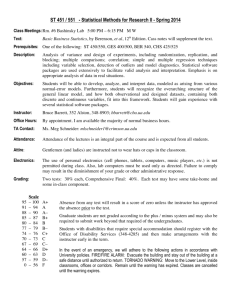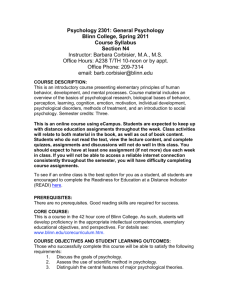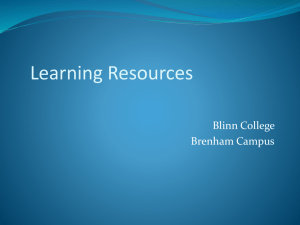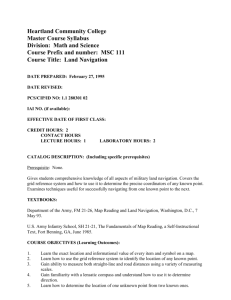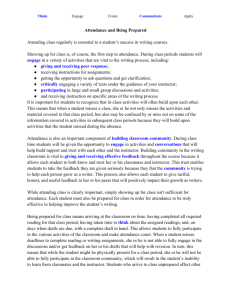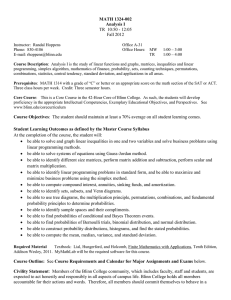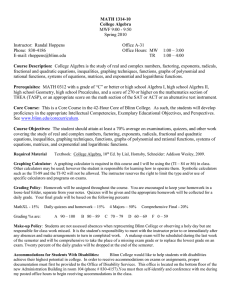Course Information Sheet for
advertisement
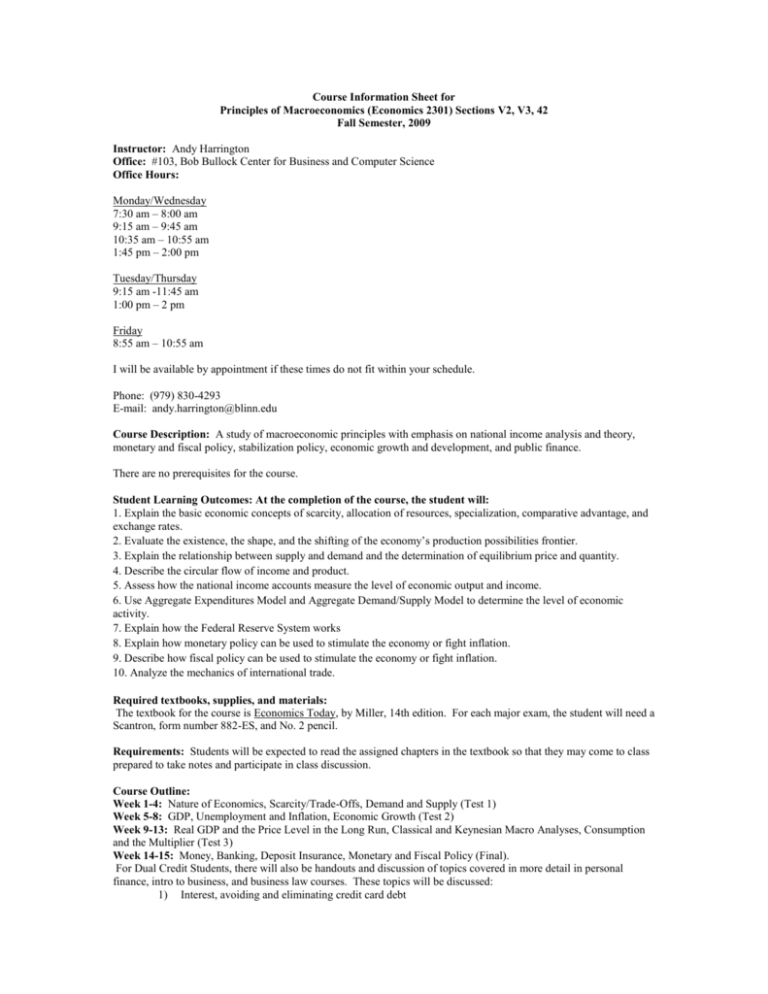
Course Information Sheet for Principles of Macroeconomics (Economics 2301) Sections V2, V3, 42 Fall Semester, 2009 Instructor: Andy Harrington Office: #103, Bob Bullock Center for Business and Computer Science Office Hours: Monday/Wednesday 7:30 am – 8:00 am 9:15 am – 9:45 am 10:35 am – 10:55 am 1:45 pm – 2:00 pm Tuesday/Thursday 9:15 am -11:45 am 1:00 pm – 2 pm Friday 8:55 am – 10:55 am I will be available by appointment if these times do not fit within your schedule. Phone: (979) 830-4293 E-mail: andy.harrington@blinn.edu Course Description: A study of macroeconomic principles with emphasis on national income analysis and theory, monetary and fiscal policy, stabilization policy, economic growth and development, and public finance. There are no prerequisites for the course. Student Learning Outcomes: At the completion of the course, the student will: 1. Explain the basic economic concepts of scarcity, allocation of resources, specialization, comparative advantage, and exchange rates. 2. Evaluate the existence, the shape, and the shifting of the economy’s production possibilities frontier. 3. Explain the relationship between supply and demand and the determination of equilibrium price and quantity. 4. Describe the circular flow of income and product. 5. Assess how the national income accounts measure the level of economic output and income. 6. Use Aggregate Expenditures Model and Aggregate Demand/Supply Model to determine the level of economic activity. 7. Explain how the Federal Reserve System works 8. Explain how monetary policy can be used to stimulate the economy or fight inflation. 9. Describe how fiscal policy can be used to stimulate the economy or fight inflation. 10. Analyze the mechanics of international trade. Required textbooks, supplies, and materials: The textbook for the course is Economics Today, by Miller, 14th edition. For each major exam, the student will need a Scantron, form number 882-ES, and No. 2 pencil. Requirements: Students will be expected to read the assigned chapters in the textbook so that they may come to class prepared to take notes and participate in class discussion. Course Outline: Week 1-4: Nature of Economics, Scarcity/Trade-Offs, Demand and Supply (Test 1) Week 5-8: GDP, Unemployment and Inflation, Economic Growth (Test 2) Week 9-13: Real GDP and the Price Level in the Long Run, Classical and Keynesian Macro Analyses, Consumption and the Multiplier (Test 3) Week 14-15: Money, Banking, Deposit Insurance, Monetary and Fiscal Policy (Final). For Dual Credit Students, there will also be handouts and discussion of topics covered in more detail in personal finance, intro to business, and business law courses. These topics will be discussed: 1) Interest, avoiding and eliminating credit card debt 2) 3) 4) 5) 6) 7) 8) 9) 10) 11) 12) The rights and responsibilities for renting or buying a home Managing money to make the transition from renting a home to home ownership Starting a small business Being a prudent investor in the stock market and using other investment options Beginning a savings program and planning for retirement Bankruptcy Types of bank accounts available to consumers and the benefits of maintaining a bank account Balancing a checkbook Types of loans available to consumers and becoming a low-risk borrower Understanding insurance Charitable giving Note: The time allotted for the coverage of the topics listed above is a tentative schedule. We might find that some topics will require additional time while others could take less time. Grading: As noted above, there will be three major exams, a comprehensive final exam, and a number of graded homework assignments. The final grade will be computed as follows: 15% of exam one grade, 15% of exam two grade, 15% of exam three grade, 25% of the final grade, and 30% of the homework avg. Homework will be posted on Ecampus along with practice tests/questions. Log into Ecampus by: 1) Go to www. blinn.edu 2) Click on the Ecampus icon 3) Enter in your 6 digit Student ID number, and birthday 4) Click on the Economics class icon. 5) If you have trouble logging in, call 979-209-7298. The distance education homepage is a great resource for Ecampus problems. Due dates for the homework will be given in class. Homework will be due by 11:50 PM the night before the next class is scheduled to meet. Homework will only be submitted on Ecampus. If there is anything wrong with the computer/e campus (ex. virus) I expect an email/call by 6 pm the night the homework is due discussing the problem. If you do not call/email me then you do not have an excuse, and you will receive a zero. Class Policies: 1. Make-up exams and late assignments. A late exam or homework will not be accepted unless sufficient evidence is presented to the instructor to explain the situation. 2. Academic honesty. Cheating will be dealt with according to Blinn College policy. 3. Food and drink are not allowed in class. 4. Cell phones are to be turned off unless you are an exempted individual according to Blinn College policy. Additional Notes: During the first class meeting, I will present procedures to follow in order to succeed in this class. These include being prepared for class by reading the chapters before class, paying attention in class, asking questions when you are confused, and understanding cause and effect relationships. There are many benefits to be had from successfully completing this course. Not the least of which is your being prepared to take more advanced economics courses at the senior college of your choice. Also it will benefit you in the future, in regards to the size of your personal bank account. Civility Statement: Members of the Blinn College community, which includes faculty, staff and students, are expected to act honestly and responsibly in all their actions and words. Therefore, all members should commit themselves to behave in a manner that recognizes personal respect and demonstrates concern for the personal dignity, rights, and freedoms of every member of the College community, including respect for College property and the physical and intellectual property of others. If a student is asked to leave the classroom because of uncivil behavior, the student may not return that class until he or she arranges a conference with the instructor: it is the student’s responsibility to arrange for this conference. Civility Notification Statement: If a student is asked to leave the classroom because of uncivil behavior, the student may not return to that class until he or she arranges a conference with the instructor; it is the student’s responsibility to arrange for this conference. Attendance Policy: The College District believes that class attendance is essential for student success; therefore, students are required to promptly and regularly attend all their classes. Each class meeting builds the foundation for subsequent class meetings. Without full participation and regular class attendance, students shall find themselves at a severe disadvantage for achieving success in college. Faculty will require students to regularly attend class and will keep a record of attendance from the first day of class and/or the first day the student’s name appears on the roster through final examinations. If a student has one week’s worth of unexcused absences during the semester, he/she will be sent an e-mail by the College requiring the student to contact his/her instructor and schedule a conference immediately to discuss his/her attendance issues. Should the student accumulate two weeks worth of unexcused absences, he/she will be administratively withdrawn from class.
